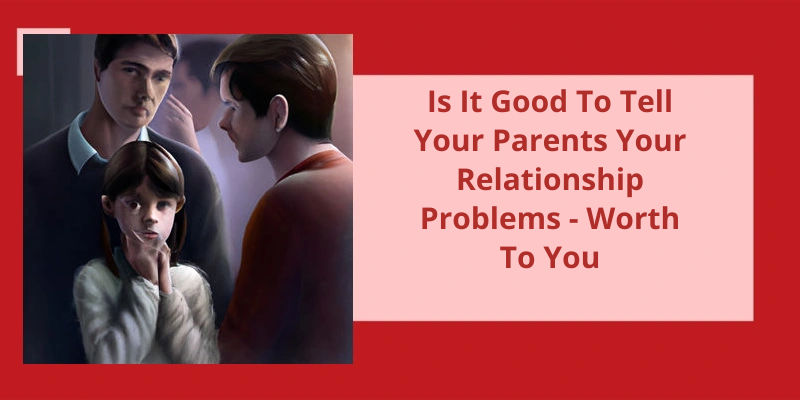However, divulging every little detail of your relationship problems to your parents may not always be the best course of action. While it can be tempting to seek their advice and guidance, it's important to consider whether sharing your troubles with them is truly worth it. Before deciding whether to confide in your parents about your relationship problems, it's crucial to weigh the potential benefits and drawbacks and consider what’ll be most beneficial for your well-being and the health of your relationship.
Is It Bad to Hide Relationships From Parents?
Is it bad to hide relationships from parents? Many would argue that it’s all right to wait until youre comfortable telling them. It’s your prerogative to keep some aspects of your life private, including your romantic relationships. While open communication with your parents is generally encouraged, it isn’t mandatory to divulge every detail of your love life. Relationships can be complex and personal, and sometimes it takes time to fully understand and navigate them yourself. Thus, it’s totally okay to wait until you feel ready to share this part of your life with your parents.
One important aspect to consider is your own comfort level. If you feel uneasy or apprehensive about discussing your relationship with your parents, it’s perfectly fine to hold off on having that conversation. After all, you’re entitled to your own boundaries and deciding when and how to share certain information is entirely up to you. It’s essential to prioritize your own emotional well-being and ensure that youre in a place where you feel ready to have those conversations.
Additionally, timing is crucial in revealing relationship problems to your parents. It may be beneficial to wait until you’ve processed your feelings and gained some clarity about the situation before involving your parents. This allows you to present a more coherent and well-thought-out discussion, increasing the likelihood of receiving valuable advice or support. By taking the time to reflect on your own first, you can approach the conversation with a clearer understanding of your needs and concerns.
It’s also worth considering the dynamics of your relationship with your parents. Not every parent-child relationship is created equal, and not everyone has parents who’ll respond supportively or empathetically to relationship woes. If you suspect that your parents may not be understanding or helpful, it may be wise to wait until you find other sources of support or until you’re confident in your ability to handle the situation independently.
Ultimately, disclosing relationship problems to your parents should be a personal decision that’s based on your own readiness and comfort level. It’s essential to remember that your journey in understanding and resolving these issues is yours alone, and you’ve the right to navigate it at your own pace. Whether you choose to confide in your parents or seek guidance elsewhere, it’s crucial to prioritize your own well-being and happiness above all else.
nervous or concerned). Every relationship is unique and it’s ultimately your decision to disclose or withhold information from your parents. However, open and honest communication with your partner is essential in maintaining a healthy relationship during this process.
Is It OK to Not Tell Parents About Relationship?
Anxious or hurt by the lack of introduction). Ultimately, it’s your decision whether or not to share your relationship problems with your parents. While it can be beneficial to have their support and guidance, it’s important to assess the dynamics of your relationship with your parents and the potential impact their involvement might have.
On one hand, they may offer valuable advice and perspective, drawing from their own experiences. They can provide a fresh perspective and offer unbiased opinions on how to navigate difficult situations. In some cases, they may even have helpful solutions that you havent considered. Additionally, having your parents support can provide emotional comfort and reassurance during challenging times.
They may inadvertently cause unnecessary tension or interference, further exacerbating the issues at hand. Sometimes, parents may project their fears or biases onto your relationship, leading to skewed advice or judgment. It’s important to remember that no one knows your relationship better than you and your partner, and external interference can complicate matters further.
Open and honest communication with your partner should always come first, as they’re the one directly involved in the relationship. Consider seeking guidance from a relationship counselor or therapist who can provide unbiased advice and help you navigate through difficulties. Remember, what matters most is finding a solution that works best for you and your partners well-being.
Source: Is it bad that I don’t like telling my parents about my love life?
However, as time goes on and couples become more independent, it’s often best to maintain a level of privacy within the relationship. While it can be tempting to seek advice from parents, it’s important to establish healthy boundaries and tackle issues as a couple. Let’s explore the reasons why it may or may not be okay to tell your parents about your relationship problems.
Is It Okay to Tell Your Parents About Your Relationship Problems?
They’ve likely gone through their own share of challenges and can offer valuable insights and advice. However, it’s important to consider the dynamics of the relationship with ones parents. If there’s a healthy and open line of communication, sharing relationship problems with them can be beneficial. It can provide a different perspective and support system during difficult times.
On the other hand, if the relationship with parents is strained or if they tend to be overly judgmental or intrusive, it may not be the best idea to share intimate details about ones relationship problems. This can potentially cause further stress and strain on both the individual and the relationship itself.
Ultimately, the decision to involve parents in relationship problems should be based on the individuals comfort level and assessment of their parents ability to handle the situation in a supportive and constructive manner. It’s essential to find a balance between seeking guidance and maintaining boundaries within ones relationship.
In addition to parental involvement, it’s crucial to also consider seeking professional help if necessary. Relationship counseling or therapy can provide an unbiased and expert perspective on the issues at hand. A licensed therapist can guide individuals through challenging times and assist in finding constructive solutions to problems.
Ultimately, the most important factor is open and effective communication between partners. It’s essential to discuss ones concerns and issues directly with ones partner in order to work towards resolving them together. While seeking support from parents can be helpful, it shouldn’t replace open and honest communication within the relationship.
Ultimately, seeking support from both parents and professional help, if needed, can contribute to healthy and constructive resolutions in relationships.
According to relationship therapist Aimee Hartstein, having a difficult family can pose significant challenges in a relationship. While not all family problems directly cause relationship issues, instances where families are toxic or extremely challenging can have a noticeable impact on both partners. In such cases, it becomes crucial to address the issue and communicate effectively, as it may require acknowledging the negative influence and finding ways to navigate through the difficulties.
Can Family Problems Cause Relationship Problems?
Difficult family dynamics can indeed cause significant strain on a relationship. When one partner comes from a problematic family background, it can directly impact their behavior, emotional well-being, and overall ability to form and maintain healthy relationships. Family problems such as unresolved conflicts, toxic communication patterns, or even abusive behavior can create a ripple effect that extends beyond the individual.
For instance, if one partner grew up witnessing their parents constantly arguing, it may lead them to have difficulty with conflict resolution as adults. They might struggle to express their needs or engage in open, honest communication. This can create frustration and misunderstandings within their relationship, potentially causing further rifts. Furthermore, if the partner has unresolved issues with their family, it can create a sense of emotional baggage that they bring into the relationship, leading to emotional distance and difficulty in forming deep connections.
However, deciding whether to share these relationship problems with your parents is a personal choice. It depends on the level of trust and openness within your family, as well as the nature of your relationship with your parents. If your parents are supportive, understanding, and have a healthy relationship with you, confiding in them might provide valuable insights and emotional support. On the other hand, if your parents are part of the problem or have a history of dismissing your feelings, it may be more beneficial to seek guidance from a therapist or trusted friends.
The impact can manifest in various ways, such as difficulty with communication, unresolved conflicts, or emotional baggage. It’s essential to recognize and address these problems to prevent them from negatively impacting your relationship. However, the decision to involve your parents in these issues should be based on their ability to provide support and guidance while considering your own comfort and needs.
However, the decision to go against one’s parents for a love marriage is a complex and deeply personal one, which involves considering cultural, familial, and personal values.
Is It Wrong to Go Against Parents for Love Marriage?
When it comes to matters of love and marriage, it isn’t uncommon to find oneself at odds with their parents expectations and wishes. The question of whether it’s wrong to go against parents for love marriage is a deeply personal one, with no one-size-fits-all answer. Many factors come into play, such as cultural and societal norms, parental beliefs, and individual circumstances.
It’s important to remember that every individual has the right to make choices regarding their own life and happiness. If you’re certain that the person you love is truly the right one for you, then it’s your prerogative to pursue a love marriage, even if it means going against your parents wishes. After all, it’s your life, and you’re the one who’ll have to live with the consequences of your decisions.
That being said, it’s essential to approach such situations with sensitivity and respect. While it isn’t ethically wrong to prioritize your own happiness, it’s important to consider the impact your decision may have on your relationship with your parents. Open and honest communication can go a long way in bridging the gap between conflicting perspectives.
Sometimes, parents may have reservations based on their concern for your well-being or cultural expectations. It can be helpful to have open conversations with them, explaining your feelings and intentions. By addressing their concerns and demonstrating your commitment to the relationship, you may be able to find common ground or at least a better understanding.
It’s crucial to weigh your own desires and happiness against the potential consequences and strains on your relationships. Only you can determine what’s truly best for your own well-being and future.
It can be disheartening when your parents don’t allow you to have a boyfriend or girlfriend. However, before jumping to conclusions, it’s important to have an open and honest conversation with them about your feelings. Express your readiness for an important relationship and explain the reasons behind your desire. Remember, your parents likely have valid concerns and fears that they genuinely want to address. By creating a safe space for dialogue, you may be able to find common ground and work towards a resolution that satisfies everyone involved.
What to Do if Your Parents Won’t Let You Have a Boyfriend?
It can be a challenging situation when your parents won’t give their consent for you to have a boyfriend or girlfriend. It’s important to approach this issue with understanding and open communication. Rather than resorting to frustration or resentment, take the time to express your feelings to your parents. Let them know how their decision makes you feel and the reasons why you believe you’re ready for a relationship.
Start by having an open and honest conversation with your parents. Choose a time when everyone is calm and relaxed, allowing for a productive discussion. Explain to them why you desire to have a boyfriend or girlfriend. Share your thoughts on how you feel ready to experience an important relationship and the personal growth it can offer. Assure them that your focus isn’t solely on romance, but also on learning valuable life lessons.
Give your parents an opportunity to express their fears or concerns. Your parents decision may stem from their desire to protect you or worries about potential negative consequences. By listening to their perspective, you can gain valuable insights into their reasoning and address any misconceptions they may have regarding your maturity or readiness for a relationship.
In some cases, you may need to prove your responsibility and maturity over time to earn your parents trust. Show them that you can handle a relationship by being responsible, setting boundaries, and demonstrating good decision-making skills. By showing your commitment to maintaining a healthy balance between your relationship and other important aspects of your life, such as academics and personal goals, you can build trust with your parents and potentially change their perspective.
Ultimately, it’s vital to approach the situation with patience and understanding. Keep the lines of communication open and continue to express your feelings and thoughts respectfully. While you may not achieve immediate resolution, providing your parents with a clearer understanding of your desires and demonstrating your maturity can increase the chances of finding a solution that’s agreeable to everyone involved.
Finding Compromise by Suggesting Specific Boundaries or Guidelines That Can Help Address Your Parents’ Concerns While Still Allowing You to Have a Boyfriend or Girlfriend
When it comes to discussing your relationship problems with your parents, it can be beneficial to find a compromise that satisfies both parties. One approach could be suggesting specific boundaries or guidelines that address your parents’ concerns while still allowing you to have a boyfriend or girlfriend.
Conclusion
However, when it comes to the intricacies and challenges of a romantic relationship, it’s important to approach the situation with caution. While parents often have their children's best interests at heart, sharing every detail of a relationship problem with them may not always be the best course of action. It’s crucial to consider the dynamics of your relationship with your parents and their ability to offer sound and unbiased advice. Opening up to your parents about relationship problems can sometimes lead to biased opinions or potential interference in your personal matters. It’s important to strike a balance between seeking support from your parents and maintaining a level of privacy in your relationship. In some cases, seeking guidance from a professional counselor or therapist may be more beneficial in finding a resolution to relationship issues.






